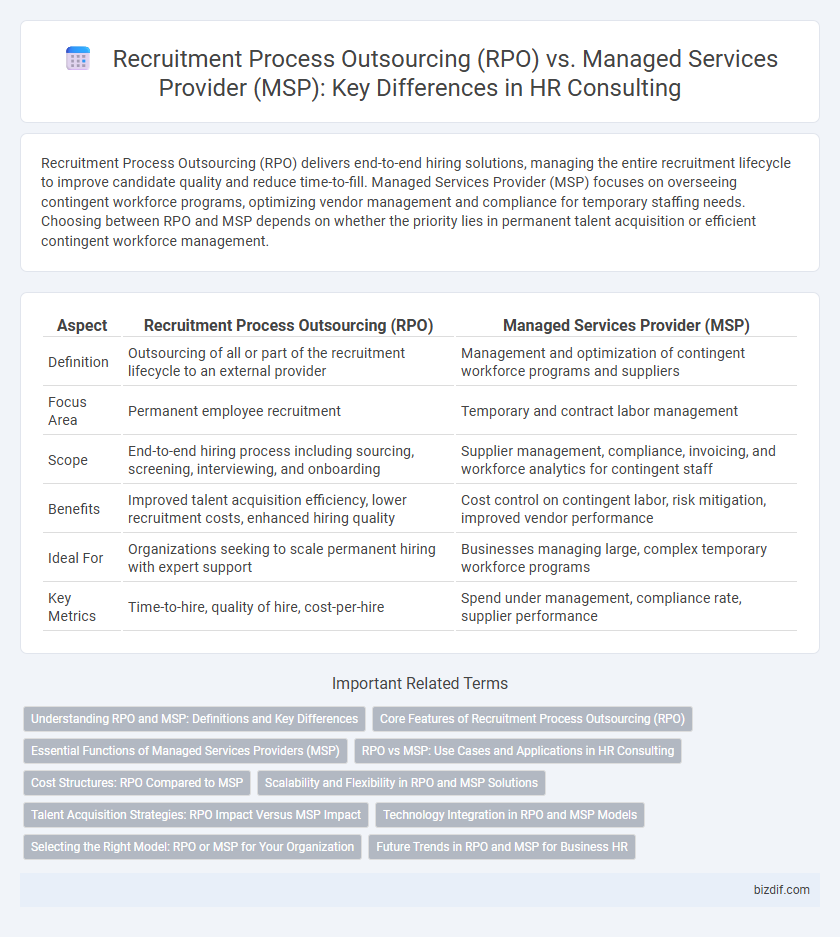Recruitment Process Outsourcing (RPO) delivers end-to-end hiring solutions, managing the entire recruitment lifecycle to improve candidate quality and reduce time-to-fill. Managed Services Provider (MSP) focuses on overseeing contingent workforce programs, optimizing vendor management and compliance for temporary staffing needs. Choosing between RPO and MSP depends on whether the priority lies in permanent talent acquisition or efficient contingent workforce management.
Table of Comparison
| Aspect | Recruitment Process Outsourcing (RPO) | Managed Services Provider (MSP) |
|---|---|---|
| Definition | Outsourcing of all or part of the recruitment lifecycle to an external provider | Management and optimization of contingent workforce programs and suppliers |
| Focus Area | Permanent employee recruitment | Temporary and contract labor management |
| Scope | End-to-end hiring process including sourcing, screening, interviewing, and onboarding | Supplier management, compliance, invoicing, and workforce analytics for contingent staff |
| Benefits | Improved talent acquisition efficiency, lower recruitment costs, enhanced hiring quality | Cost control on contingent labor, risk mitigation, improved vendor performance |
| Ideal For | Organizations seeking to scale permanent hiring with expert support | Businesses managing large, complex temporary workforce programs |
| Key Metrics | Time-to-hire, quality of hire, cost-per-hire | Spend under management, compliance rate, supplier performance |
Understanding RPO and MSP: Definitions and Key Differences
Recruitment Process Outsourcing (RPO) involves transferring all or part of the recruitment activities to an external provider who manages the talent acquisition process end-to-end, focusing on improving hiring quality and reducing time-to-fill. Managed Services Providers (MSP) specialize in managing contingent workforce programs, including supplier management and compliance oversight, aiming to optimize temporary labor costs and vendor performance. The key difference lies in RPO targeting permanent recruitment solutions, while MSP handles contingent workforce and vendor management services.
Core Features of Recruitment Process Outsourcing (RPO)
Recruitment Process Outsourcing (RPO) delivers end-to-end talent acquisition solutions, managing the entire recruitment lifecycle from candidate sourcing to onboarding. It provides scalable hiring processes, leveraging advanced technology and analytics to improve recruitment efficiency and quality of hire. RPO enhances employer branding, reduces time-to-fill, and offers strategic workforce planning aligned with organizational goals.
Essential Functions of Managed Services Providers (MSP)
Managed Services Providers (MSP) specialize in overseeing and optimizing contingent workforce programs, ensuring compliance, cost control, and supplier management. MSPs provide strategic workforce planning, vendor consolidation, and real-time analytics to enhance workforce visibility and efficiency. Their essential functions include managing temporary staffing, streamlining contingent labor procurement, and maintaining risk mitigation protocols.
RPO vs MSP: Use Cases and Applications in HR Consulting
Recruitment Process Outsourcing (RPO) excels in filling high-volume or specialized talent gaps by managing end-to-end recruitment, ideal for organizations seeking to scale quickly or improve candidate quality. Managed Services Provider (MSP) focuses on contingent workforce management, streamlining vendor relationships and optimizing contingent labor costs for companies with significant temporary staffing needs. HR consulting leverages RPO for strategic talent acquisition initiatives, while MSP supports workforce flexibility and compliance in dynamic labor markets.
Cost Structures: RPO Compared to MSP
Recruitment Process Outsourcing (RPO) typically employs a variable cost structure based on hiring volume, allowing companies to scale recruitment expenses according to demand, whereas Managed Services Providers (MSP) often use fixed or retainer fees for managing contingent workforce programs. RPO costs are influenced by metrics such as cost-per-hire and time-to-fill, providing transparency and performance-linked fees. MSP pricing models concentrate on vendor management and contingent labor administration, which may result in higher fixed operational costs regardless of hiring fluctuations.
Scalability and Flexibility in RPO and MSP Solutions
Recruitment Process Outsourcing (RPO) offers scalable talent acquisition solutions by allowing businesses to rapidly adjust recruiting resources based on hiring volume fluctuations, ensuring agility in workforce expansion. Managed Services Provider (MSP) models deliver flexibility in managing contingent workforce programs through integrated vendor management systems that optimize supplier performance and compliance. Both RPO and MSP enhance organizational capacity to adapt to market demands, but RPO emphasizes end-to-end recruitment scalability while MSP focuses on flexible contingent labor management.
Talent Acquisition Strategies: RPO Impact Versus MSP Impact
Recruitment Process Outsourcing (RPO) enhances talent acquisition strategies by delivering scalable recruitment solutions, leveraging advanced analytics to improve candidate quality and reduce time-to-hire. Managed Services Providers (MSP) focus on optimizing contingent workforce management, ensuring compliance and cost control while providing workforce flexibility. The RPO impact primarily drives strategic talent acquisition transformation, whereas MSP impacts efficient management of temporary and contract talent pools.
Technology Integration in RPO and MSP Models
Recruitment Process Outsourcing (RPO) leverages advanced applicant tracking systems (ATS) and AI-driven candidate analytics to streamline talent acquisition, enhancing efficiency and candidate quality. Managed Services Providers (MSP) integrate vendor management systems (VMS) to optimize contingent workforce procurement, ensuring compliance and cost control. Both models emphasize technology integration but differ in focus: RPO centers on recruitment automation, while MSP prioritizes workforce management through robust vendor and data integration platforms.
Selecting the Right Model: RPO or MSP for Your Organization
Selecting the right talent acquisition model involves assessing organizational needs, with Recruitment Process Outsourcing (RPO) offering comprehensive hiring management and Managed Services Provider (MSP) focusing on contingent workforce solutions. RPO enhances recruitment efficiency by leveraging technology and expertise to fill permanent positions, while MSP streamlines vendor management and compliance for temporary staffing. Analyzing workforce composition, budget constraints, and scalability goals ensures alignment with either RPO or MSP for optimized talent acquisition outcomes.
Future Trends in RPO and MSP for Business HR
Future trends in Recruitment Process Outsourcing (RPO) and Managed Services Provider (MSP) for business HR highlight increased adoption of AI-driven analytics and automation to enhance talent acquisition efficiency. Integration of advanced workforce planning tools enables seamless collaboration between RPO and MSP models, optimizing cost management and candidate quality. Emphasis on diversity, equity, and inclusion (DEI) strategies within RPO and MSP services is transforming talent pipelines to align with evolving organizational culture demands.
Recruitment Process Outsourcing (RPO) vs Managed Services Provider (MSP) Infographic

 bizdif.com
bizdif.com